Toronto single-family houses -20% from peak, condos drop to 2-year low. Vancouver -8% from peak, Hamilton -25%, Victoria -14%. But Calgary set new high.
By Wolf Richter for WOLF STREET.
House prices in Canada overall fell 1.2% seasonally adjusted in January from December. Not seasonally adjusted, they fell 0.4%, having now fallen by 18.3% from the peak in March 2022, according to the Home Price Benchmark Index for single family houses by the Canadian Real Estate Association (CREA) today.
In dollar terms, the national index has fallen by $174,300 from the peak in March 2022, to $776,300, just a hair above where it had first been in August 2021 on the way up (all amounts in Canadian dollars).
The not-seasonally adjusted month-to-month drop in January of 0.4% was bigger than the drop a year ago (-0.1%), which whittled down the year-over-year gain to just 0.8%. Some markets had sharp month-to-month drops and fell further from their all-time highs, while other markets had month-to-month gains and Calgary prices hit a new high. And we’ll get to them.
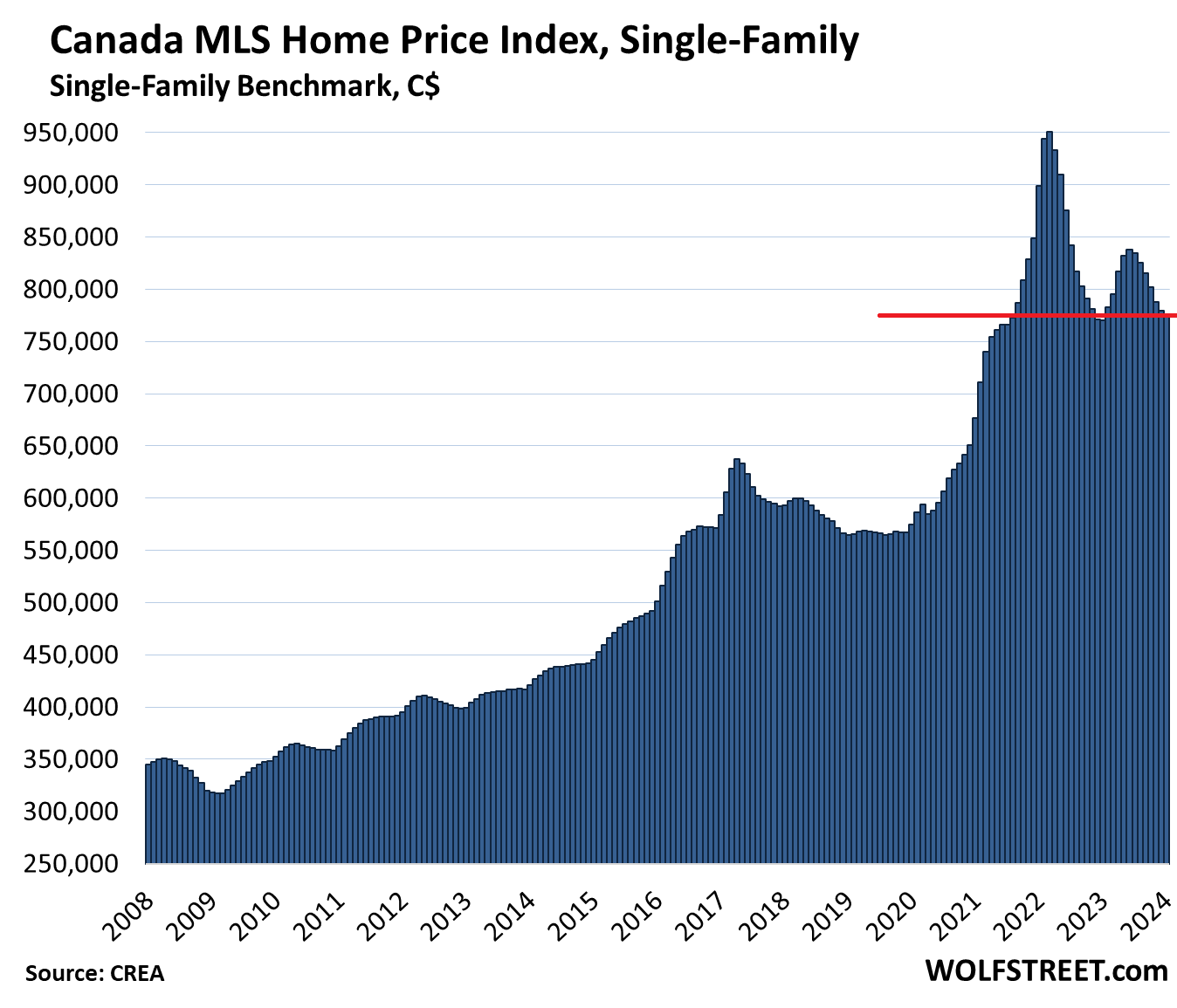
Home sales rose by 22% from the collapsed levels a year ago, but were still 9% lower than the 10-year average for January.
New listings ticked up 1.5% in January from December, which was smaller than the increase in sales. And so supply ticked down to 3.7 months’ of sales at the end of January, from 3.8 months’ at the end of December.
Easy money vanished, inflation is here. The Bank of Canada has tightened policy to deal with this inflation, it hiked its overnight rate to 5.0% in July and has kept it there. And it has been shedding over half of the pile of securities that it had added during its pandemic-money-printing binge. And for part of last year, it looked like inflation had been licked, and the rate-cut bets were all getting lined up in a row, and bond yields and mortgage rates dropped in feverish anticipation.
But at the end of 2023, inflation – especially the two measures the Bank of Canada prefers – refused to cooperate with the rate-cut bets and instead re-accelerated.
So yields and mortgage rates rose again in January and into February. They’re now higher than they were a year ago. In March 2023, mortgage rates plunged on rate-cut hype; the Government of Canada 5-year yield, which is crucial for the types of mortgages that are common in Canada, fell to the 2.8%-3.2% range in the spring months, and that helped fuel the spring selling season. And now it’s back at 3.7%.
Home Prices by Market.
Greater Toronto Area, single-family houses: The MLS Home Price Benchmark Index for single-family houses dipped by 0.2% in January from December, to $1,273,300. It’s now just a fistful of dollars – OK, an armful of dollars, $4,301 to be precise – away from carving out a new two-year low.
The benchmark price has plunged by 20.2%, or by $320,800, from the peak in February 2022, and is back where it had first been in September 2021.
A year ago in January, the index had remained unchanged. So this drop last month whittled down the year-over-year gain to 0.3%.
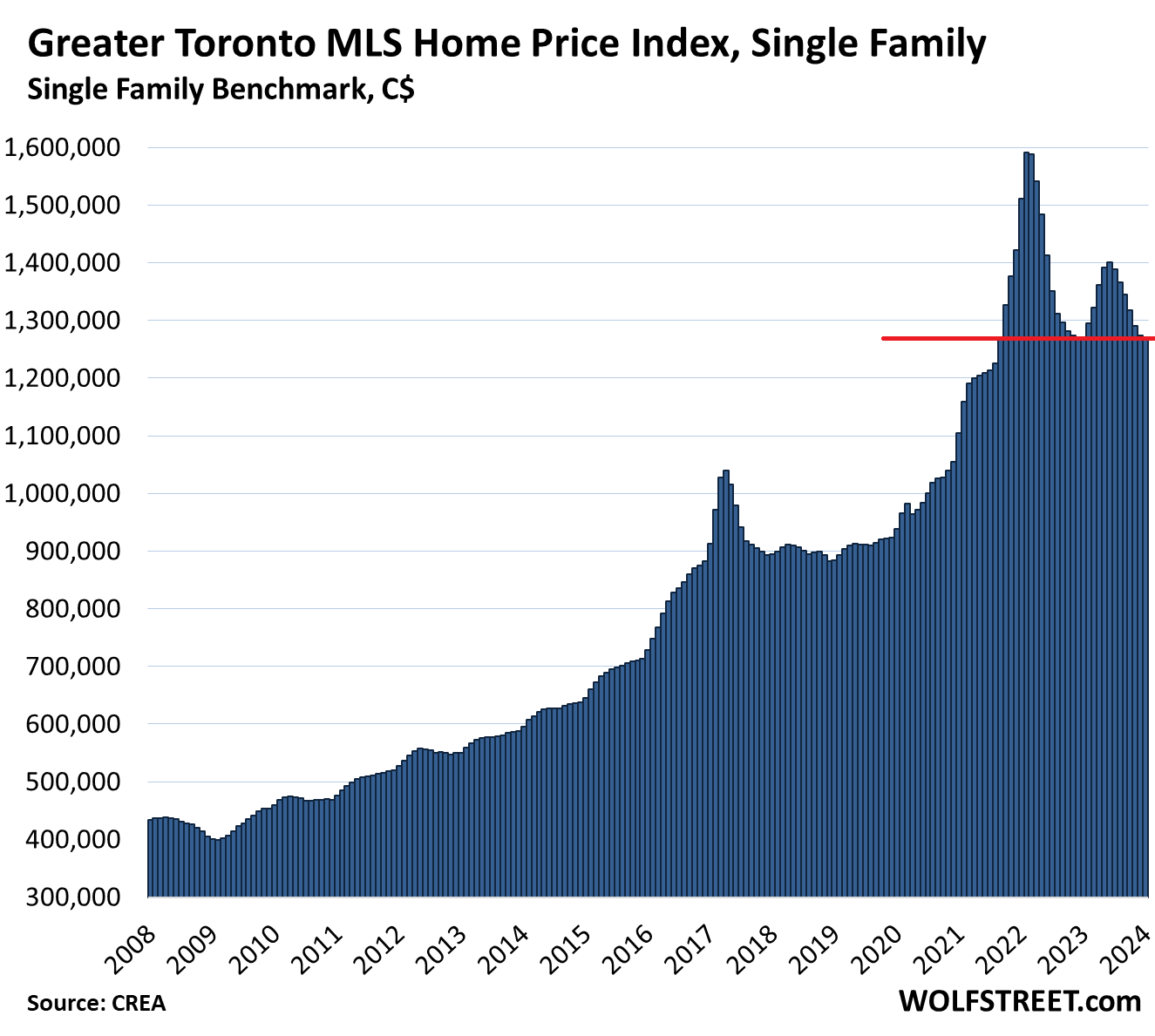
Greater Toronto Area, Condos: Prices dipped by 0.1% in January from December, to $682,600, down by 0.7% year-over-year, and by 14.6% from the peak in April 2022, marking a new two-year low:
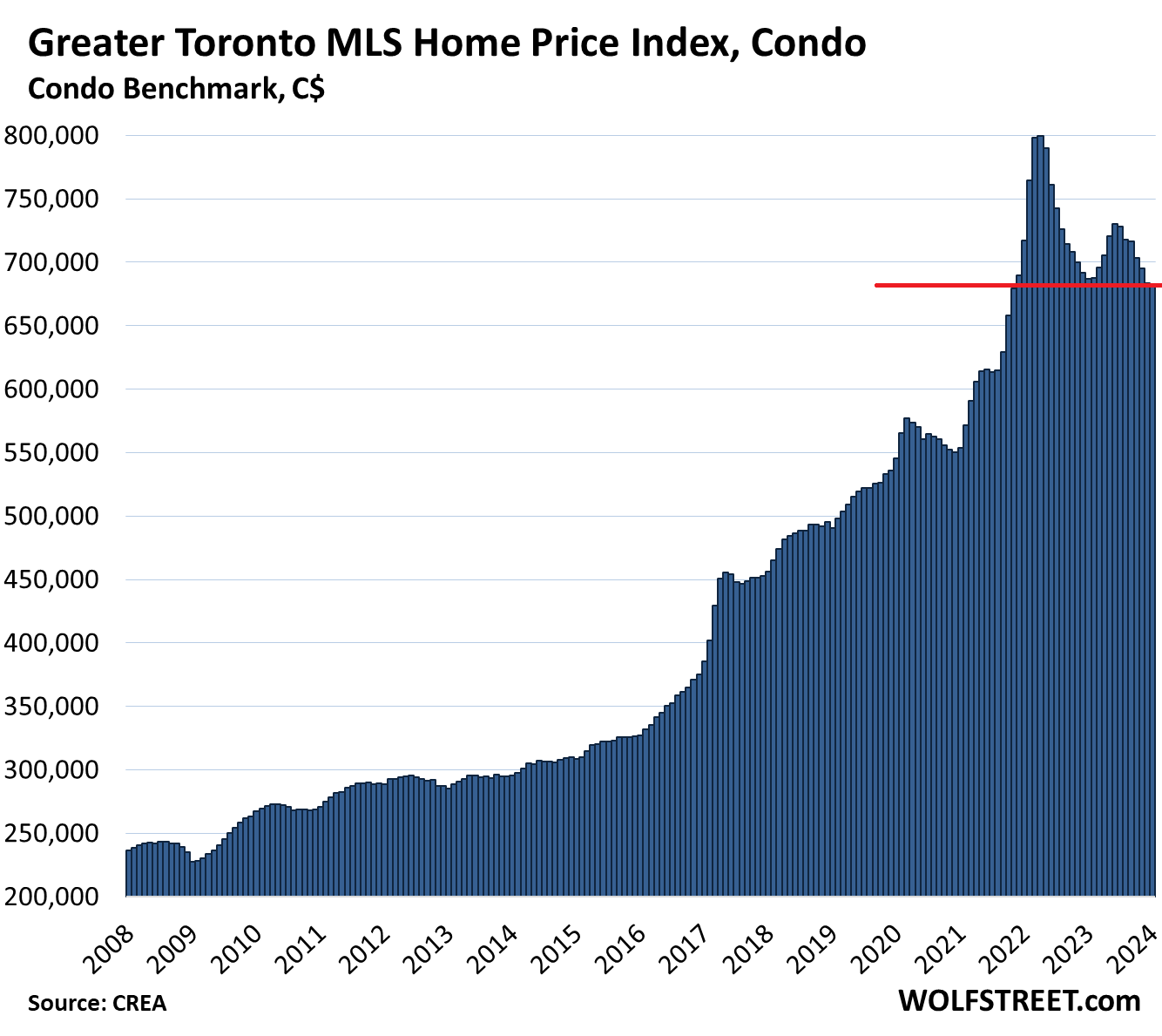
Hamilton-Burlington metro (part of the “Greater Toronto and Hamilton Area”): The single-family benchmark price rose by 1.0% in January from December, to $869,500. From the peak in February 2022, the benchmark price has plunged by 25.0%, or by $298,400.
But that month-to-month rise of 1.0% was smaller than the rise in January last year (+1.9%), and so year-over-year the index fell into the negative (-0.1%).
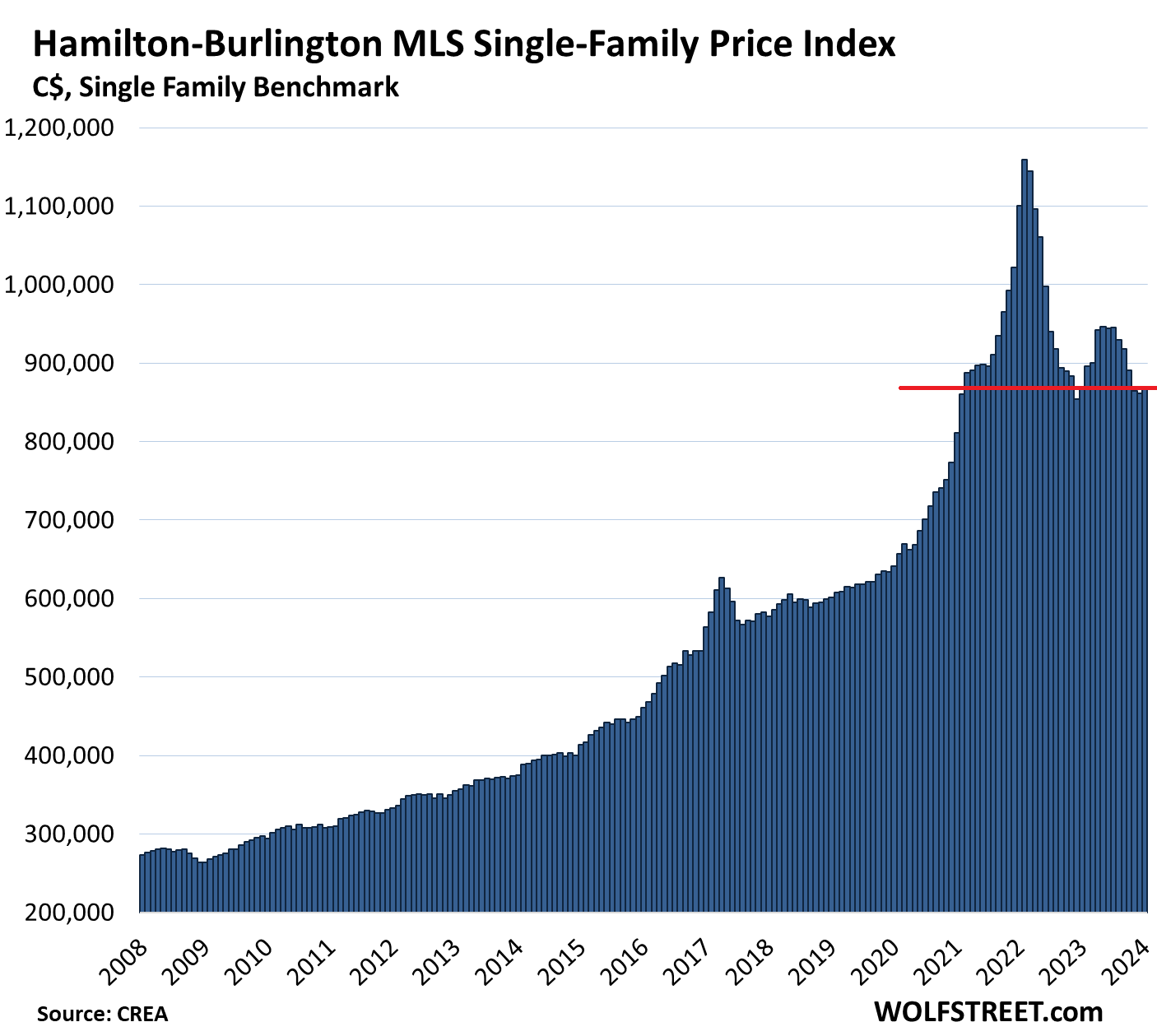
Greater Vancouver: The benchmark price for single-family houses fell 1.1% for the month, to $1,943,200:
- From peak in April 2022: -7.6% or -$158,900
- Year-over-year: +7.3%
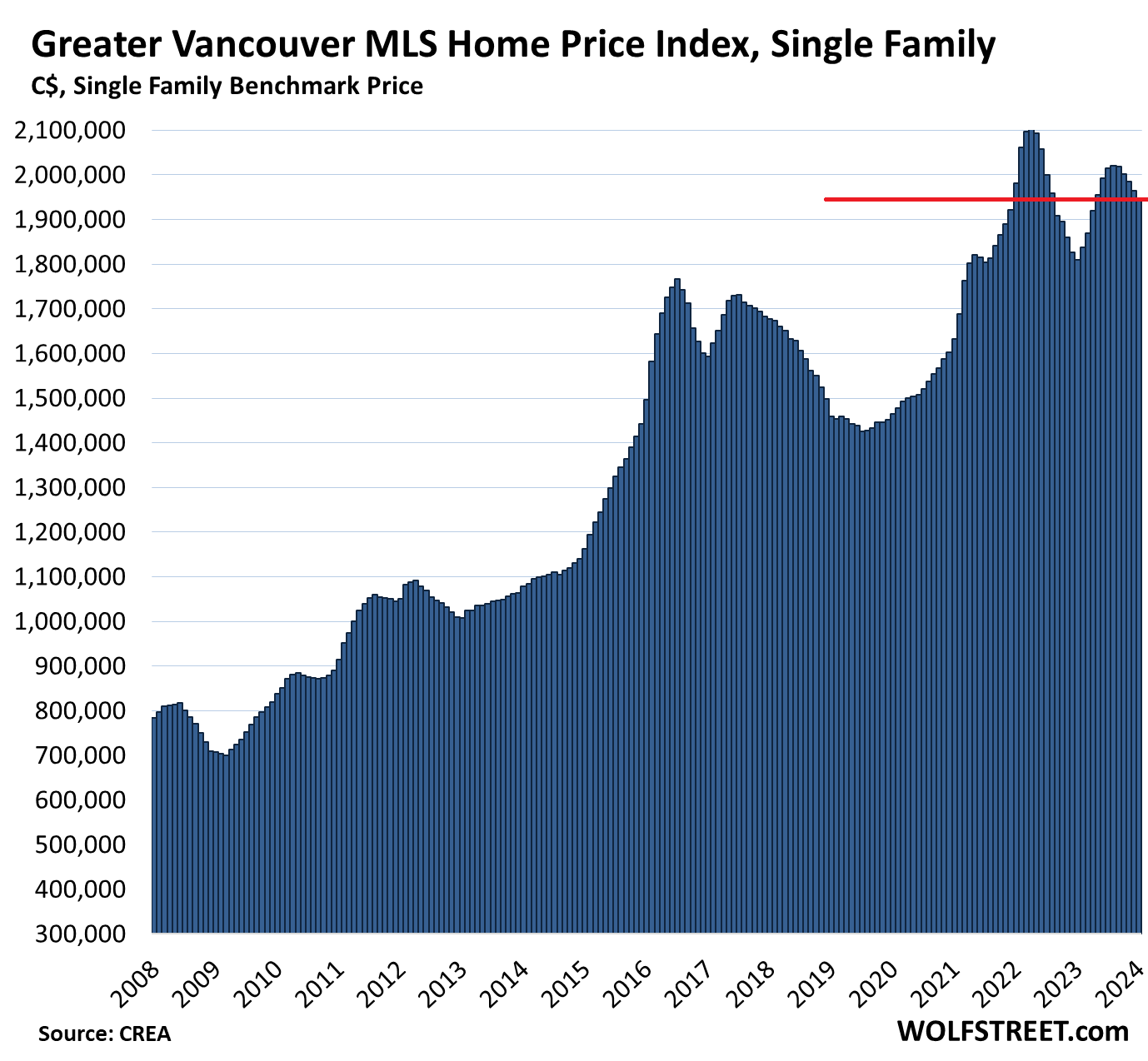
Victoria: The single-family benchmark price fell by 1.7% for the month to $1,115,300:
- From peak in April 2022: -13.8% or -$179,100
- Year-over-year: +1.2%
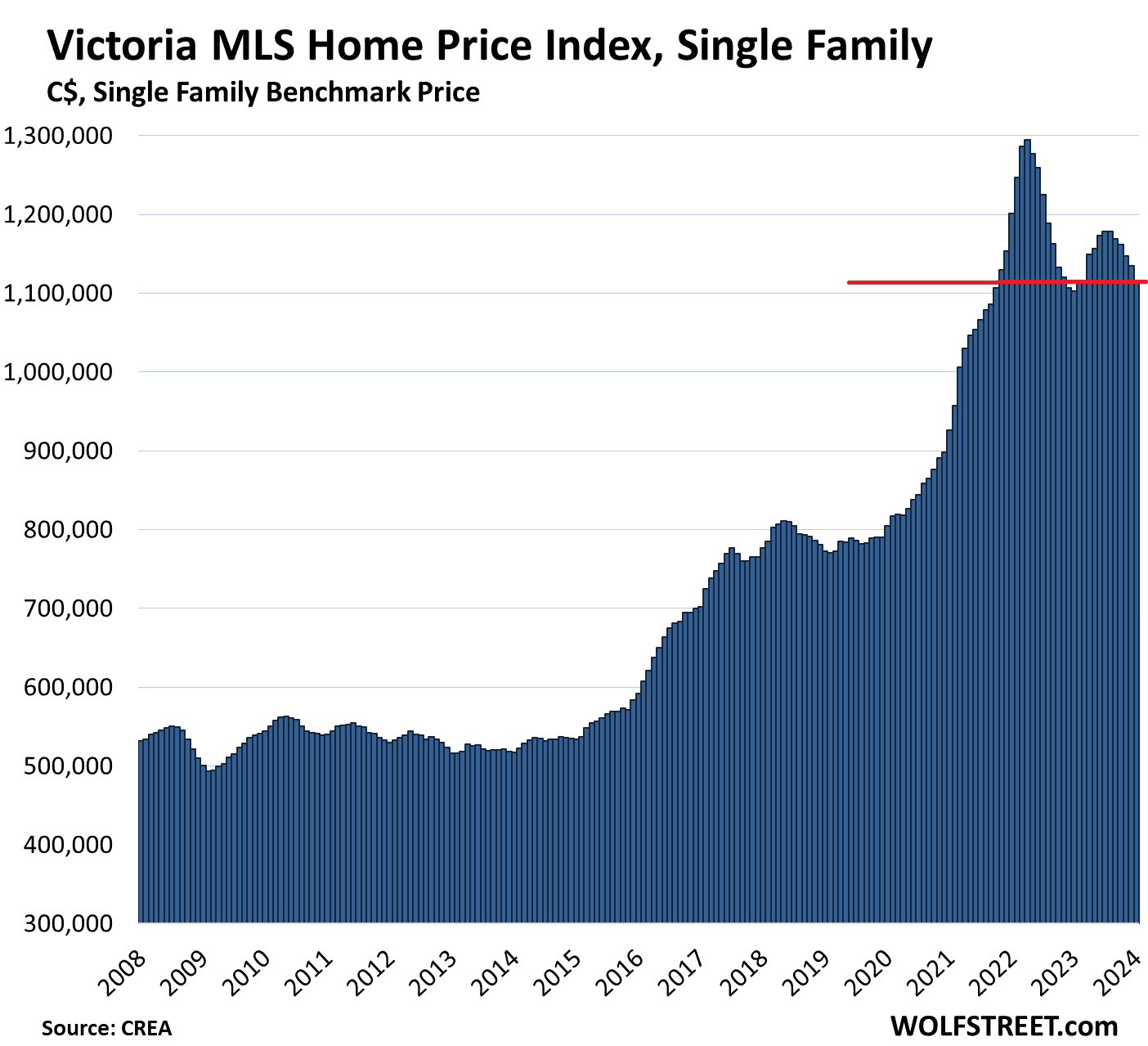
Ottawa: The benchmark price of single-family houses dipped by 0.2% for the month, to $703,500, below where they’d first been in March 2021:
- From peak in March 2022: -14.5% or -$119,700
- Year-over-year: +3.7%.
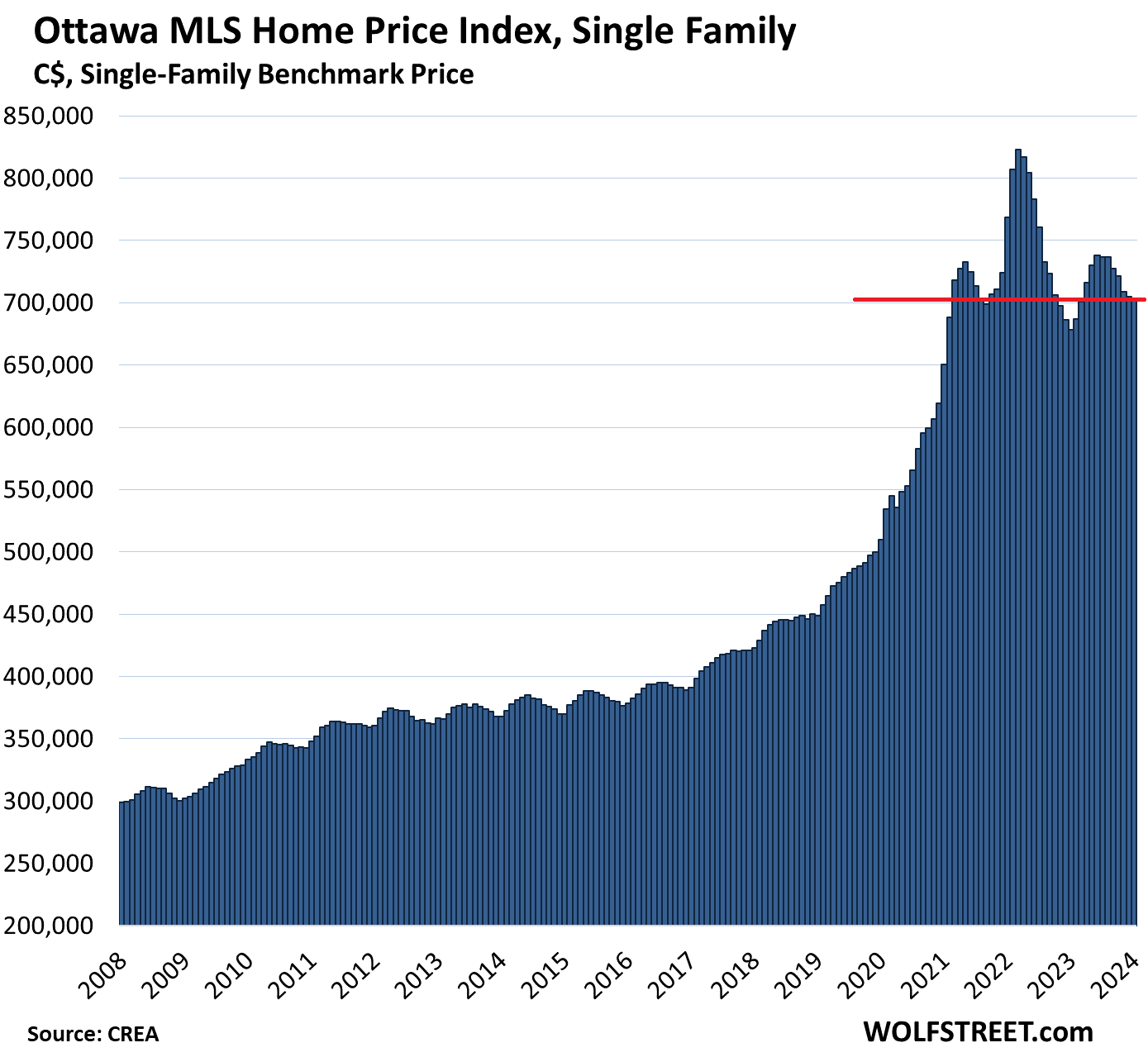
Calgary: The single-family benchmark price rose by 0.8% to a new high of $640,500. This increase, smaller than a year ago, whittled down the year-over-year gain to 11.9%.
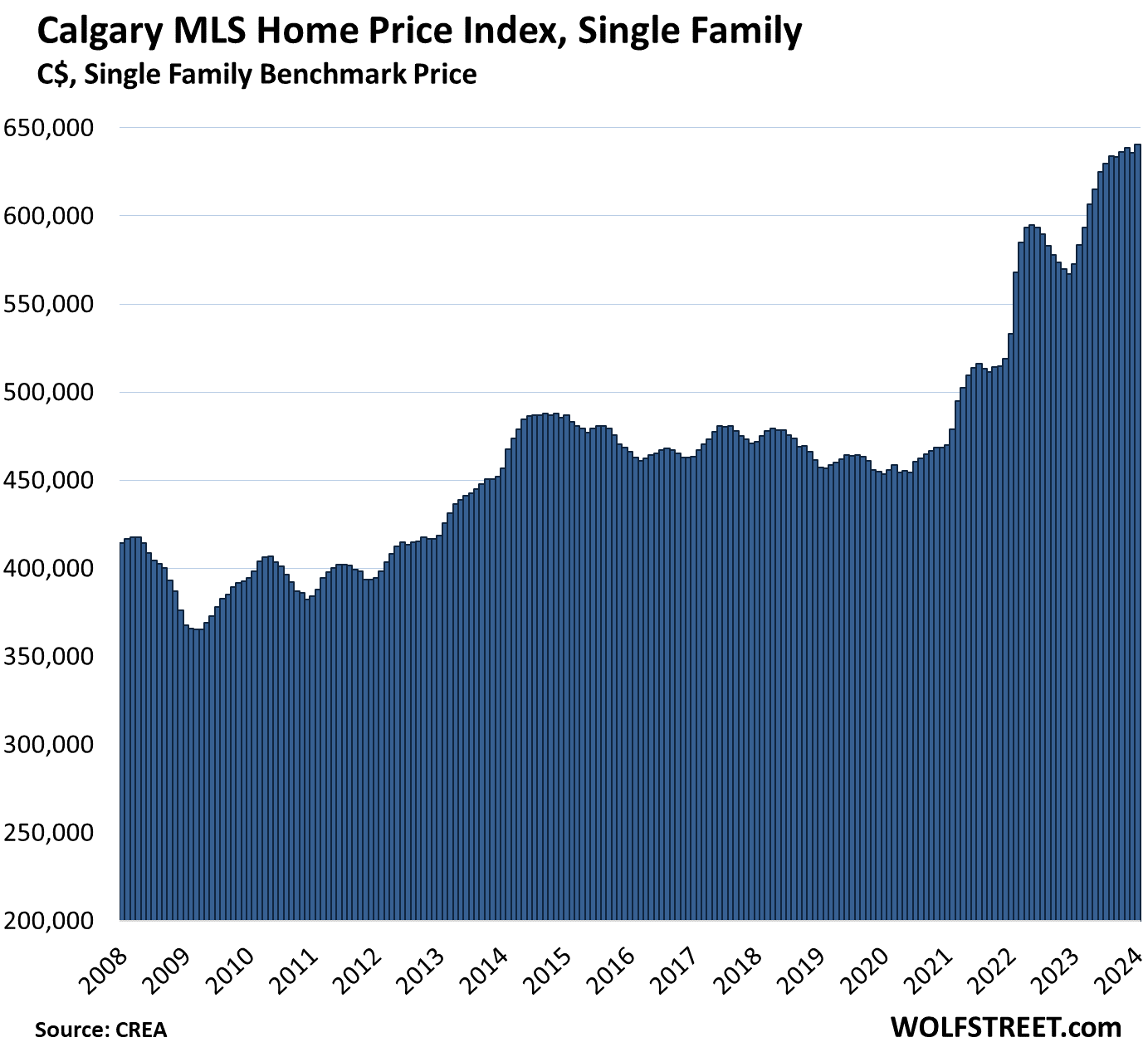
Montreal: The single-family benchmark price inched up 0.1% in January from December to $596,300. This tiny uptick – compared to the 1.7% jump a year ago – whittled down the year-over-year gain to 1.9% (from 3.5% in December).
Since the peak in May 2022, the index has fallen 7.9% or by $51,300.
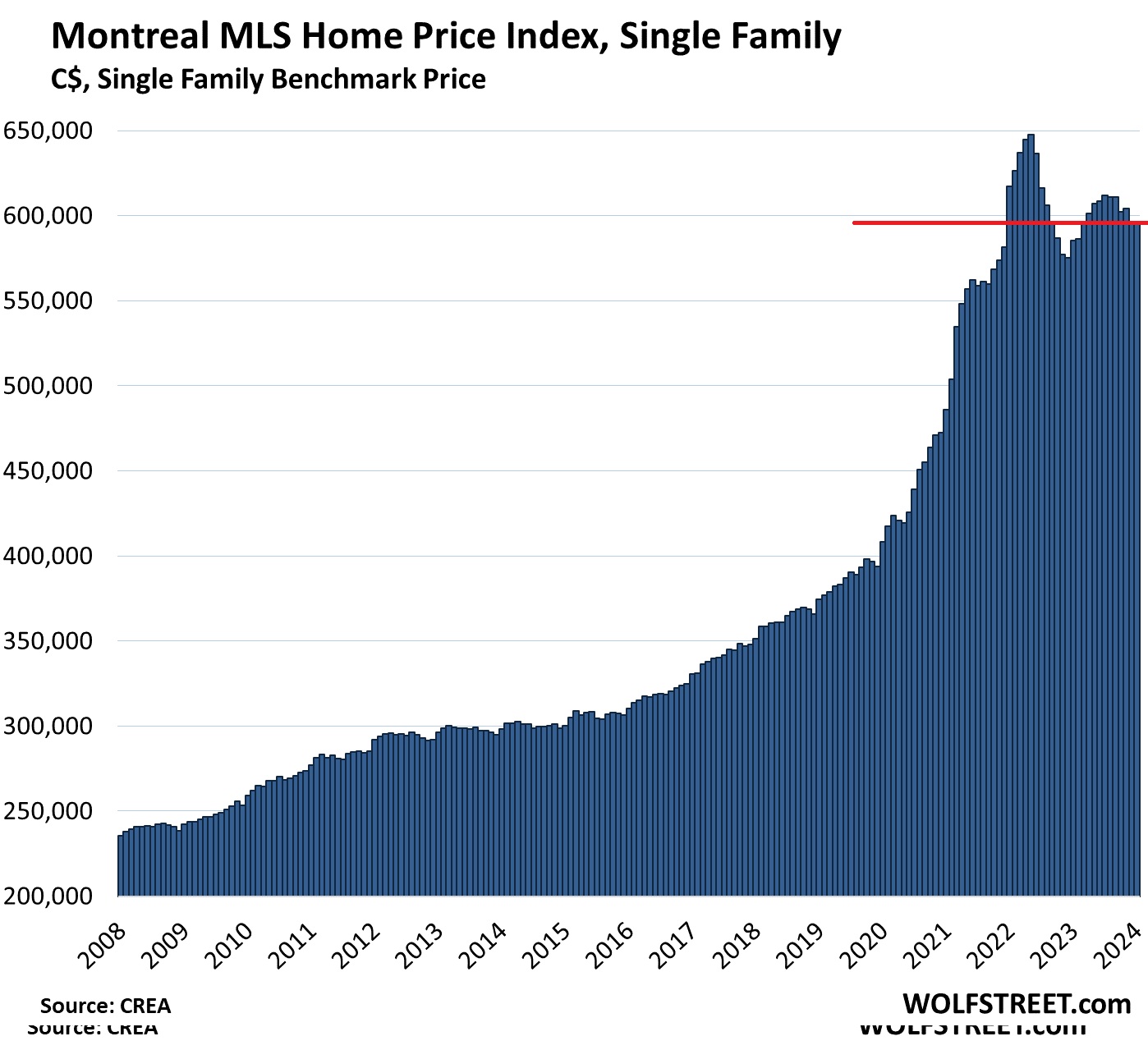
Halifax-Dartmouth: The single-family benchmark price rose 1.8%, to $530,100; but in January a year ago, the price had jumped by 5.0%, and so this smaller increase whittled down the year-over-year again to 2.7%. Since the peak in April 2022, the index has fallen by 8.5%, or by $49,400.
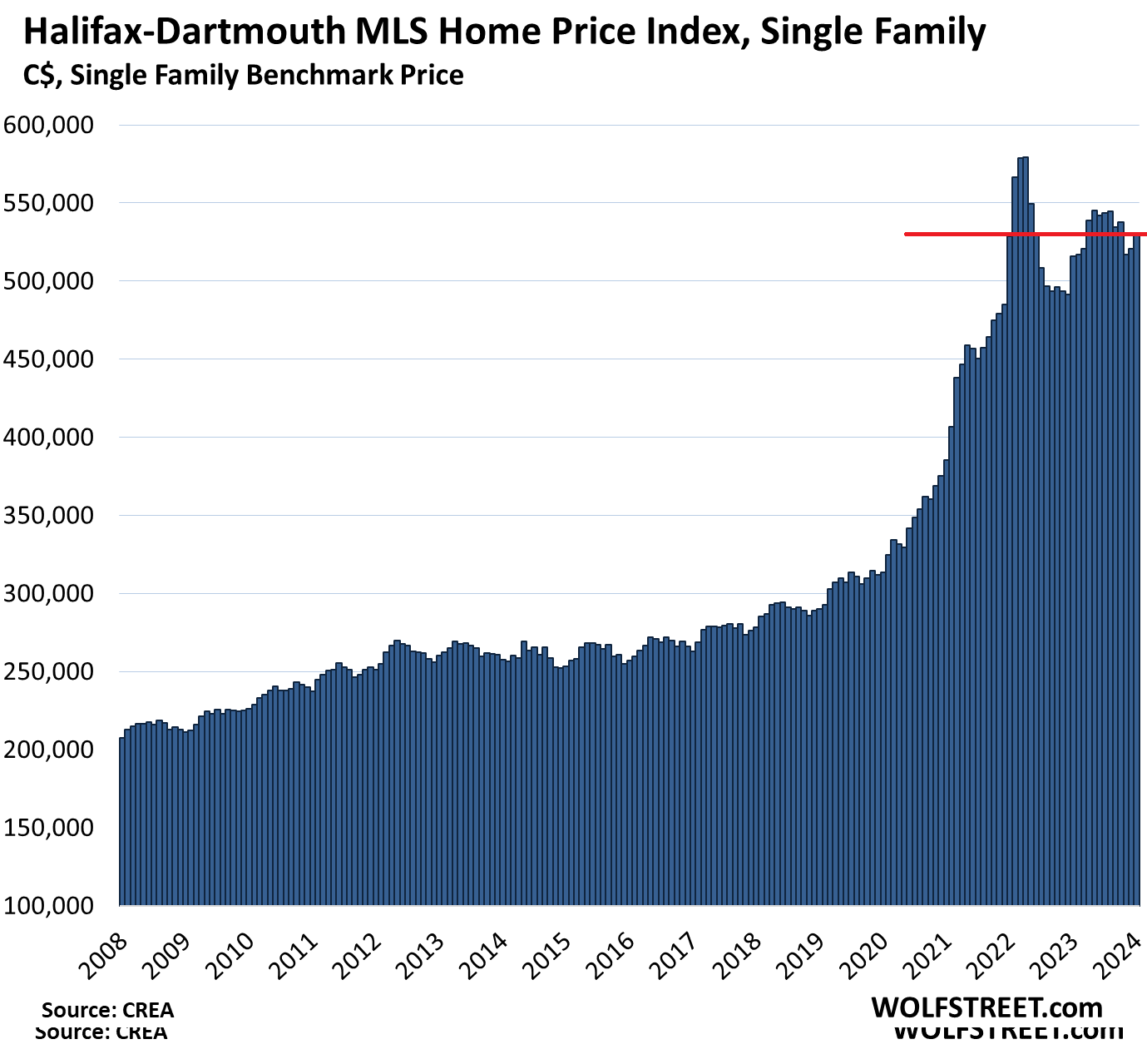
Quebec City Area: The single-family benchmark price dropped by 2.9%, to $381,300, which reduced the year-over-year gain to 5.0%. The index is now roughly back where it had first been in March 2022:
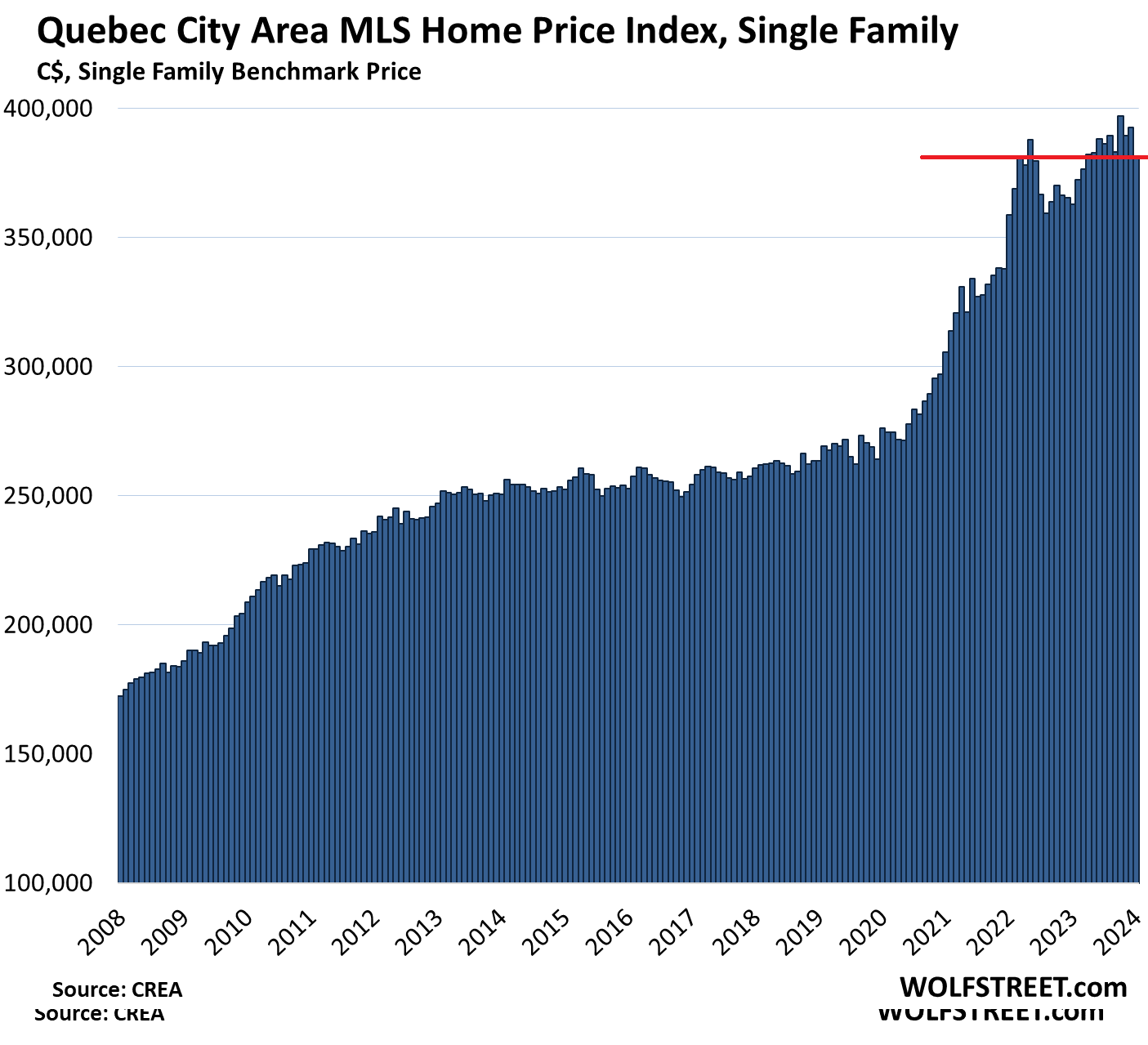
Enjoy reading WOLF STREET and want to support it? You can donate. I appreciate it immensely. Click on the mug to find out how:
![]()


Thanks WR,
The drops are still quite small if you look at in the last 5 year time frame but indeed moving in the right direction.
Hope middle/working class in Canada can afford a decent home to live not to speculate on.
Given the rise in the cost of *everything* we are miles from middle income finding housing affordable.
One gets the impression there is a global war going on against the middle class.
The 1%’ers are waging the war. They want every single dollar the middle class has.
If they keep it up, they’re going to learn that at some point, you can’t pay for security, as the security will turn on you.
That’s how developed countries can become third world.
Don’t worry when Trudeau spoke in Vancouver he said the middle class needs more high density rentals built for them. Not the middle class lifestyle Canadians used to have. I guess that is his vision for Canada now.
Part of it is inflating home standards. We had a five- person family in a 2000 ft home with chipped formica countertops in my younger days. Today, we’d want twice the square feet and better finishings, so the space and quality expectations might have doubled the past 40 years. That is costly.
Builders have what customers want but can’t pay for, in a non ZIRP world.
Excellent point. The perceived norm now is what ultra luxury was back then.
Same with cars, etc. It all ads up.
Get a good look at the charts for USA and Canada. When did the housing go crazy and screwed urban middle class. Who was in power and who voted for them to be in power (urban middle class?).
All political parties are same.
All parties are sold out to deep pockets
Shut down the immigration.
Totally out of control. How can you open the doors while the existing population suffers from inadequate housing supply.
The logic escapes me. And so does the planning ability of the people responsible for this fiasco.
Interesting how while QE “printed money” was in the form of “excess reserves” parked away (and rates were zero) the housing prices kept increasing (moniker: asset inflation), but now that those excess reserves have metamorphosed into the REAL economy (via fiscal deficits)….the higher mortgage rates have begun REDUCING home prices.
A highly stylized sketch, but still funny how econ works….
sorry, my comment is grossly incorrect. i wasn’t thinking and fingers on autopilot. the biggest increase EVER SEEN was during the 2020 QE
There will be a combination of forbearance, inflation, and further reductions in price, however will housing prices become affordable relative to income as in prior times…..I doubt it. What do others think?
It’s about the same for me.
I bought a house at in 2010, it was about 4x my income.
Fast forward 14yrs later, I make 3x what I made back then, just closed a house in B.C… and again, 4x my income.
However, if I were just starting out now, I don’t think I’d have been able to afford anything so maybe you’re on to something.
Not.
Howdy Dan Bubba believes the US is papering over the Bubbles, recessions, and well, you name it, they printed and spent trillions. How will bubbles deflate? If I live long enough, I might have an answer……
BoC apparently ending QT.
Inflation to return.
The cost of living in Canada is just *insane*.
Nobody wants to create wealth, all the Canadian brain can conceive is “making money” through existing housing stock.
Unfortunately for people living in Canada, income tax rates are very high and speculating on housing stock appears to be one of the very few tax shelters available. The tax exemption on profits from owner occupied housing in Canada is much more generous than in the US, where the capital gains exemption is limited to $250,000 (single taxpayers) or $500,000 (married couples fling a joint return).
I think the big thing could be the collapse of immigration, which Canada relies upon to add ever more pressure to existing housing stock, which is carefully controlled below the artificial population expansion.
Word travels fast on the internet, the college diploma mills are understood, both by Indians and also by employers, who won’t touch “graduates”.
The jig is up.
I know where you can get some immigrants. Do you mind if they’re poor and unskilled?
All of them are penniless they get around the $20,000 in the bank account ruse by everyone getting a loan and then combining it until it hit 20G’s and then they keep bouncing the 20 thousand around into many, many peoples’ accounts to get them to Canada. Canadian laws have more holes than swiss cheese.
What is this jig, that is up? Housing prices are nuts in every country around the world right now. Try and find a country where housing prices are ‘normal’ or affordable for lower middle class buyers. The problem is Canada needs more homes, more affordable homes. Maybe the government can finally do something about it.
The “jig” being the elites in the West foisting mass immigration onto a population that doesn’t want it and spouting lies (they’re highly educated, we need the labor) or insults (if you don’t support mass immigration, you’re a racist and xenophobe)
If you don’t mind living in a high crime city, there is lots of reasonably priced housing in places like Detroit and other central US cities. For only $450,000, you can buy a 6 bedroom 3.5 bath Tudor style home in Detroit’s Sherwood Forest neighborhood. When it was built in 1929, the neighborhood was considerably different. My guess is that a similar home in a similar neighborhood in Toronto would cost at least C$5 million.
Housing is far, far more costly in Canada, you need to look at some charts.
Looking at governments to save us won’t work. See other communist countries and what happened there. Or just look at San Francisco. It’s like a third world country.
Saving yourself is DAWAE. One way to do that is by investing in assets that outperform inflation. Your cute 5% CD won’t cut it. If you had invested in Bitcoin at 15.5k you would be smiling right now. Bitcoin is at over 50k baby. Probably over a 100k by year end!
As a Torontonian born and bread I can tell you that things looked weird as far back as 2008. Even back then prices looked ridiculous. No US-style collapse occurred. Now young people have been completely shut out of this market. We’d have to see prices cut in half to change that. Asset inflation has been devastating for most families.
Google found that “most” (~65%) American families own a home and about the same percentage of Canadian families. It must suck to watch asset prices go up faster than you can save, but it looks like “most” people in the US and Canada are happy the dumps they bought for ~$500K a decade ago are worth more than a million…
I was born in 53. Growing up in TO, when the city had an industrial base, as well as our trad role as a centre for banking and mining admin, a guy working at a General Electric assembly plant could afford a small post ww2 bungalow and one car, plus raise 3-5 kids. Women started working, but not in the same numbers. Corp taxes were much much higher. That world, which seems to be more equitable, is gone.
Then they die and the progeny get free money, and lots of it.
@Einhal The price of Northern CA homes have been well above the national average for more than 40 years and I was 40 before I knew a single person that bought a home without “help” from their parents (they paid cash for a $2mm SF home after cashing in dot com stock the day their lockout period ended), now 25 years after the dot com boom my friends that had kids before 30 are all helping their kids buy homes in Northern CA after paying for college (and I plan to help my son and daughter both buy homes when they are out of college). I like the Warren Buffett quote “Give your kids enough so they can do anything they want, but not so much that they can sit around and do nothing”…
It all started back in the mid 1970’s with the city of Agincourt a small city in Scarborough, Ontario Canada. I was one of the very first in the country to catch onto what the Chinese can do to real estate prices. Their DNA is quite different and they’re born to buy homes no matter what the price is or what condition they’re in even if they’re just blueprints. I could write books on it but I’d have to publish them outside of Canada. I moved to Markham, Ontario Canada way back in December 1982.
Thanks Wolf.
Canadian here.
Years ago, I was not comparatively concerned about Toronto & Vancouver prices. As at least the smaller centres and the main-city’s outskirts were considerably cheaper; offering an alternative. Although, then as now, real estate is not a substitute for local manufacturing and local businesses.
Now, homeownership everywhere is expensive. Not just price. Mortgages too.
While, banks got bailed out in 2008, (Canadian banks, too, in handouts), today there was & is, no central bank consideration. Despite the rapid rate increases, (example, limited transitional loans), for the existing or local homeowners. Trapped in: high cost, forced short terms, (variable; 3, 5, 7 year), flooding the demand with weathy immigration, ignoring money laundering (Wilful Blindness), 25% to 35% cummilative inflation, and higher interest rates, the local homeowners were financially screwed.
Some readings allude to: Many cdn mortgages were renewed last year; much of the remainder will over the next two years. 42% renewed at interest only. There are reports of 60 to 90 year amortizations.
There is a larger cost too. When people feel screwed, then productivity declines and commerial and public (transit) activities are impaired: work from home; quiet quiting; exiting; early retirement; rowdy to criminal civic incidences, higher government debt and deficits to pretend all is okay.
Now, there is a stronger deliniation of the wealthy and the screwed.
I am pissed off at the incompetent and the reckless leadership. Some believe it is intentional. But certainly not necessary or desired. I applaud the farmers in EU. Better now than when there is extreme inequality.
42% at interest only is insane. I’m guessing salaries are lower than in the US on average.
Seems the world has gone mad.i
Salaries are a lot lower and taxes a lot higher. Canada also has surtaxes and supersurtaxes on top of their income tax. If you make too much money a pittance amount you get no old age security. Canadians tend to be on the lazy side and next to no one works two jobs anymore to pay a mortgage even if they can’t make the payments. The competitive spirt in Canada is completely dead.
Nothing would change unless people come out on the street with Pitch Forks.
I can’t imagine living in CA for such high prices.
It was easier to print money. The CB’s abetted them.
I agree with much of what you said. I’ll add that in the past, renting was a viable alternative but now rental prices are rising rapidly across Canada. The number of newcomers (over 1 million per year) is far too high and is straining the housing market, healthcare, and government services. I’ve never seen a country as real estate obsessed as Canada. There will definitely be a time when the music stops, but for now the party goes on.
Yup, Canada has one of the highest concentrations of high net worth individuals in the world, and you can bet most of them made it through real estate. It’s a religion.
Tom I am a (sort of) wealthy immigrant to the US. I can personally tell you that after one understands this game, one only feels empathy for the displaced locals. It isn’t my fault but I feel their pain and wish it could be addressed.
I also sense the anger (sometimes) directed at me but which should be towards policy makers. It is difficult for me to explain to such people that I too am on their side.
Wow good summary Tom. The only thing I might add are Homes should not be a business of investment (not socialist thinking , just morality). Also foreign buying in the Canadian markets has all but eliminated the correction cycles in housing markets. Just as pricing begin to drop foreign buying increases and prices level then rise again within in weeks to months. From my position housing, not homes are now commodities and those in position to invest still do. As a contractor its clear. The free for all market is over. Weak, greedy, corrupt governments locally and Federally are part of the problem. But whats going to happen when the big collaspe comes? Whats housing and government going to look like? I am very worried this will look like full on Socialism. When such a large percentage of the population feels capitalism does not work for them they will turn to Socialism. Nothing to loose or try anyway! Really hope this does not happen but I do not see a good end here!
Cheers.
“Homes should not be a business of investment (not socialist thinking , just morality).”
You do realize if homes shouldn’t be realized as a business of investment you will only have two classes of residents – those that own their homes and those that live in government owned housing. This is basically socialism at its core. So anyone that advocates that homes should not be a “business ” is advocating for socialism. Not just your conventional socialism but we’re talking all people that do not own their homes (about 35% of the population) will be shacked up in government owned housing. How anyone can find this remotely palatable is next level bonkers.
This “socialism” bogey is tiresome. Offer a solution for low income housing or just shut up already.
Clearly “the market” is NEVER going to provide sufficient low income housing.
Eg,
Agree. I don’t like socialism in large doses, but socialism is not an enemy. It’s just a viewpoint, or an option, regarding level of safety net. No need to get riled up about it. Same with capitalism.
Canadian Tire (a retailer for which I’m not sure there’s a US equivalent — it’s a sort of “everything store.” Maybe like a Walmart with an automotive supply and repair section tacked on?) just reported a 67% decline in net income last quarter.
I think that’s a fairly good indication that those mortgage renewals at much higher interest rates are starting to bite into discretionary spending. Hard.
The company has never made a profit on anything but their credit card division. Now with credit card debt stretched to the limit in Canada defaults are rising.
Both Cons and Libs have reckless leadership. For example, Harper gave cmhc 25billion to insulate liabilities instead of allowing our housing bubble to pop in 2008 with America. Canada’s gdp rose 166% since 2000 because of the housing bubble! Canada has had the highest household debt in the G7 for a long time. During the pandemic, people used cerb to pay off credit cards or it would look even worse today. The politicians, economists and bankers keep adding makeup to the pig but in the end it’s still a pig!
Comment from Western Canada, everybody is obsessed with real estate and I see no rationality with this obsession. My next door neighbor’s house offered for sale attracted a long line of amateur investors wanna be. Sold for cash with no conditions to a renovation contractor. All the homes listed for sale in my hood could yield around 1 to 2% ROE if rented out, not enough to have a mtg loan. If the home buyers are leveraged then they are under the pressure unless high income earners. My take : we have a high inflation baked into the economy which will eventually balance the high prices of homes and rents with the ever rising incomes or we’ll have the flush down of a housing market in parts of Canada. Interesting times to be alive.
A lot of income properties, especially in Toronto and especially condos, show cap rate negative even before the interest rate rise, and lucky to get 1 or 2 percent. They were banking on the perpetual property price increase. If considering a cap rate of 5 or 6% as normal and reasonable reveals they are at least 100% overpriced as an investment.
With condo assignments, pure speculation, the market is dead and specs are eating huge losses, losing full deposits and more.
You have to wait a year or more now to sell so with the empty home tax in Ontario and British Columbia in order to profit you have to do short term rentals and then sell after one year of ownership. The rules changed about a year and a half ago.
After tripling in 10 years and to have a 18% pullback is not abnormal! I guess you are on of the poor investors who missed 300% gains…again!
Or histrionics sells beer mugs!
Sure, it’s not big deal. Housing busts take years to work out, the US housing bust took five years. So this is year #1.
Also, basic math may not be your strength:
1. If something “triples,” as you said, for example from 100 to 300, it’s a gain of 200%, not 300% LOL
2. If there is a pullback of 18%, as you said, your 300 is back to 246, which reduces your gain from 200% to 146%. So that’s less than half of your “300% gain.”
3. If there is a 50% pullback after tripling, it’s back to 150, and your gain over those 10 years is down to 50%.
4. Then from this 50% gain, you need to subtract mortgage interest, property taxes, insurance, maintenance, etc. for 10 years and see where you are. Carrying costs of a house as an investment are high.
BTW, we don’t “sell” our mugs. The mugs are gifts for very generous donations of $100 or more. Some donors want the mugs, and some donors don’t.
Ha ha
1:0 for you Wolf
Howdy Lone Wolf. More truth from you. Hope the Youngins read your posts….
This is your classic Canadian.
Smug.
Innumerate.
Wrong.
I thought Canadians said this about us USians.
I thought this report was interesting
——-
Younger adults are increasing wealth faster than Gen x and Boomers. A new wealth inequality study from the New York Federal Reserve found that adults under the age of 40 have grown their wealth a whopping 80% since 2019, far outpacing the financial growth of their elders.
“Real wealth has increased for all three age groups since 2019,” the NY Fed researchers wrote, “but the change has been most dramatic for younger adults.”
How. They are investing in risky assets while the Boomers are happy with 5% Bonds.
If an adult under 40 increased their $100 investment account to $180 in the last 5 years you can say they “have grown their wealth a whopping 80%” (Wolf can check my math). Every year kids from 5 to 15 years old increase their height by a greater percentage than adults but the main reason for the big “percentage increase” is they start with a small number (almost all young adults have a lower net worth than the average Gen Xer and Boomer and I bet the “average” 80% 5-year increase in actual dollars is less than a 10% one year increase in actual dollars for an average Boomer net worth.
Very good point and your spot on. It shows you that anything can be spun to look very good are very bad. The article had much more info. It said Boomers are sitting on 97 Trillion in wealth. Think there 76 million boomers. This comes to an average of over 1.2 million per boomer. But this an average and the median much much lower at $260k. Here is a chart from the money.com article that was using data from a FED report.
under 40 wealth increased 4 trillion. Boomer over 20 trillion. But that 20 trillion is very concentrated to the top 1%.
Wealth in 2019 | % of U.S. wealth in 2019 | Current wealth | % of current U.S. wealth
Age 18-39 $5 trillion 4.9% $8.9 trillion 6.6%
Age 40-54 $25.5 trillion 23.5% $27.3 trillion 20.5%
Age 55+ $74.5 trillion 75.4% $97.3 trillion 72.9%
A third of 18-34-year-old Americans live with their parents. That provides opportunities to save money and thereby increase wealth.
Few under 40 are day traders and from what I’ve lived through all ponzi’s at some point in time end. Their only hope is the U.S. dollar falls off a cliff and they stay in America forever.
Free up some housing in Canada by selling some of those cottages. How many Canadians have the equivalent of a second home that sits empty during the off season.
So force owners to sell their multi-generational passed down privately owned family cottages out in the bush? Almost no immigrants and refugees want to live there anyway, and there are few job opportunities.
That could only sound feasible to a tenured academic, an expert for hire, a politician, or a bureaucrat.
Maybe that needs a rethink.
Our condo in Calgary just came up for rent, it went in a day; the rental agency has a wait list of ideal candidates — they rented it to a single female police officer with a kid. It probably helped we didn’t put the rent up in the past year, so they got a great deal. Anyway, valuations are poised to go up 10-15% this year; at least in Calgary. There is no supply.
I’ve been watching Calgary for years.
Two years ago, unemployment in Calgary was one of the highest in Canada at 11 percent.
Housing is offered at prices much lower than in other provinces.
When oil production slows down even more and jobs start to shrink, people from other provinces will start to leave Calgary. This will of course lead to a drop in rents and house prices in your area.
Calgary’s economy relies heavily on the oil industry.
The population growth in Calgary will hopefully help diversify the economy there. If the provincial government wasn’t shortsighted, transitioning to more renewables could go a long way in preventing boom/bust with oil prices. Regardless, Alberta remains a bastion of economic opportunity in Canada.
You have to live in Calgary to rent something out in Calgary. All through time this is the reason real estate values there plummeted seemingly forever. Also property taxes are always about 35 percent higher than what you’d get if you sold property there. All the property managers are crooks in all of Alberta.
To afford payments on a single family house in Toronto ,a family should make around $300,000
annually .
Get live up to date boots on the ground data – Melody’s telegraphing to all.
Not to mention Martino-Booth.
I am waiting and watching (Florida) with popcorn.
DM: Now the maker of Heinz ketchup, Kraft mac-n-cheese and Philadelphia admits punishing price hikes has hit sales – are food giants finally getting the message?
Price hikes from Kraft Heinz have backfired – as cash-strapped Americans cut out big brands and turn to cheaper alternatives.
Good. I have zero sympathy for the price setters who have been responsible for a significant portion of the inflation.
Our oldest is a ketchup fiend, always bought Heinz when the different between store brand wasn’t that large. When Heinz went from $3.xx to $5.xx, we switched to the store brand and haven’t looked back.
Canada is an awesome place to live. I would not want to live anywhere else. Great environment, neighbours and community.
The cost of housing makes no sense there is virtually unlimited land and unlimited lumber in this country. The trades that I have used in the past have been exceptional in skill and in price. One older guy I had worked for 30.00 an hour and him and I put an entire steel roof on my building in 6 hours. The building was cut from my spruce trees that my neighbour sawed on his sawmill. Most of them were blown over in a nor-easter. I had to hire an engineer to certify the lumber but the lumber was better and cheaper than any box store. The entire building cost $11000 for a 24 x 30 ft tractor barn. the only problem was the building permit generated a new assessment and my property taxes more than doubled.
I hate that the values have gone up so much the property taxes and insurance go up as well and we get the same services but pay double or triple for them. If you are going to live in house the last thing you really want is for property values to go up. It only makes the banks and insurance companies richer and you poorer. Not to mention it is keeping the next generation from the joys of home ownership.
Good insights. Thanks.
The scarcity is artificial.
The government restrict building.
If enough is somehow built they open the floodgates to immigration.
The recent massive immigration was a banking bailout by forcing up rents.
Corruption here is endemic, nothing ever gets done. No healthcare.
Potholes in every single road.
Dirty, expensive supermarkets.
Middle class used to get 30k untaxed every year via house price appreciation. That’s now over.
Canada was a nice place up to around the mid 1980’s. Now the entire country is ruined. White Rock was the last nice city to be destroyed.
Canada could fix the housing crisis in about 2 years just open up 10% of the crown land for development. But keep greed off of the table. Only first time home buyers with a family income under 500 k can bid then give low cost loans to develop housing and they have to live in the house for 10 years . or some combination like this. No developers or with strict profit controls on developers. Transparent books.
Are you kidding? Where’s the /s?
Crown land is owned by ALL Canadians. It’s not meant to be chopped down and paved over by a few billionaire developers (cough cough Ontario greenbelt scanda). What we need is huge investments in public transit and removing height restrictions (some cities are doing this, ie. Vancouver). Densify!
You are correct and I am wrong Crown land should not be used it is a great thing as is. and It would make us all poorer and a few richer no matter how it was set up I should have kept that idea to myself
Fred Degasperis owned all the land in Ontario. A good friend of my father all the way back to high school at Jarvis Collegiate. Fred would have been the richest Canadian had he not died.
Canada believes is can fix the climate problem with more taxes but it can’t fix the homeless problem. ;)
Howdy Folks and especially you Youngins. Need a home? Purchase a starter home. A home you can afford and as cheap as possible. You will have to work your a$$ off and possibly end up with a bad back like me.
Rinse Repeat and gain RE wealth……….
It’s not doable for many people today as it was in the past.
Howdy Einal If a person is all thumbs you are correct. My 2 sons are doing quite well using this formula. Youtube ing was not around in the past for me. 7 years into their first home, lived with awful kitchens and baths at first. 50 % equity with HELOC loans to do RE investment….Took a lot of work and 7 years of their lives…… I started years ago 12, 000 first home and ended 40 years later, 625 000 of total equity when sold last home number 6 . Flipping is AOK in any market but takes a lot of work……. Physical work…….
Would like to add, after the 2nd or 3rd property, you should no longer need a mortgage. After the newly purchased property is finished, I would HELOC the entire equity, which was usually greater than the homes value…… Plenty of cash for RE investment…….
Yeah that’s all fine and dandy but 50 years ago you didn’t have corporate flippers competing with tons of cheap money…
The world you grew up in is not the same world as we have today
The job market in Toronto is terrible if one isn’t born into wealth ,or has connections to a well-paid job.
Nobody can afford to buy a Halifax home, much less a Vancouver or Toronto home on a $17/hr wage.
Halifax/New Brunswick homes cost C$500,000 while the median (not average) wage in Canada is about $50,000. 10x a yearly wage.
In Toronto, job agencies want Master and Phd degree holders to work for $16.55/hr on a one month contract via staffing agencies.
Canada doesn’t have more than 5 large cities to live in. Vancouver is too expensive, Calgary is a boom and bust oil economy, Winnipeg is colder than Mars during winter, the GTA is overcrowded, Ottawa is for bureaucrats, and Montreal is hard to find a job if one doesn’t speak French.
Are you in Canada?
Howdy Einhal. Thats why I proudly posted what my sons have done….. We had RE companies for competition and was just more smaller companies to compete. My sons are just turning 30s. It can be done. One is an accountant and other insurance…They find the hard work gratifying….
No mention of land costs. You’re out of your depth.
Howdy georgist Not sure you were posting to me? But, the formula is for pre existing housing. Worked well for me and is working well for my 2 sons.
I agree with you 100%. Bought high in 2005, but worked hard to make the place amazing. 16 years later, sold and bought one of the best places in town. Repeating now, but not to sell.
Only an owner will do a perfect renovation job. Most flippers do it cheap and crappy so it lasts just long enough to sell.
Also makes you proud of your place when you’ve put in work.
And you’re not out of your depth. So many people just don’t have the juice to do it.
Howdy MussSyke YEP. I sold my personal residence this way and moved the family 6 times. HELOC loans supported all my other RE investments. LLC the investment properties in case of trouble…
Owe Canada, interest rates resetting on real estate on your native land.
So other developed countries have either entered recession or have seen a drop in CPI (actual deflation). It seems like the people who said that the U.S. was being propped up by its ability and willingness to deficit spend were spot on.
Usa would keep doing Deficit spending and inflating away the debt is the only game in town
Working class is and would get screwed big time.
Yup. It’s awfully difficult for the US to tip into recession when the US Federal government is running record high peacetime deficits.
The news today that retail sales plunged almost 1% in January was so spectacular and astounding that the Dow is now up more than 317 points and all commodities are soaring with gas near $80 per barrel.
If you have a minute (well, maybe 4 minutes), read this:
It Sucks Being a Retailer in January and February. But Do Retail Sales Show Consumers Cut Back? A good time to look at seasonality and inflation/deflation in retail sales, especially as prices of goods have dropped.
https://wolfstreet.com/2024/02/15/it-sucks-being-a-retailer-in-january-and-february-but-do-retail-sales-show-consumers-cut-back/
MW: First-quarter GDP forecast cut after decline in U.S. retail sales, and toi Wall Street that means the Fed is ‘going to pivot’!!!
LOL, GDP growth was cut to +2.9% growth, from 3.4%. Which is still huge and red hot. Do you guys ever actually read anything other than headlines?
Canada doesn’t operate on a free market policy, if the politicians decided to halt infrastructure in the same of some social justice cause, while packing bodies from abroad to live in Canada.
The Mayor of Brampton Patrick Brown lamented that 25 international “students” were found living in a basement.
TPTB in Canada wants more warm bodies to pay rent or overbid on wartime bungalows which cost no more than a years’ wages of a factory worker in the 1950s.
People have to realize that Toronto and Vancouver housing are distorted for some strange reason.
In the 1950’s, a “wartime bungalow” cost a lot more than a year’s wages of a Toronto factory worker. But lots of European immigrants to Toronto could afford to buy a modest home within a few years of their arrival in Toronto and could move up to a more modern home in the suburbs a few years later. It wasn’t until the Arab oil embargo of 1973 that house prices started to escalate faster than wages. In the late 1970’s, Quebec’s French language laws encouraged a lot of English speakers to leave Montreal for Toronto and other cities, further widening the spread between Toronto and Montreal real estate prices.
Factory workers at the GM plants across the GTHA were paid quite well in Canada, almost triple or quadruple minimum wage.
In 1985, my uncle worked at a Ford plant for C$16/hr, which in today’s dollars would be about $40/hr. In 1985, a 3-bedroom 1-bath home was about $100,000 even during the late 1980s housing bubble.
But Toronto today? They want to pay people $16/hr, expect miracles from employees like Biblical times, and expect the serfs to either pay C$2,500 a month rent, or C$2.5 million for that same bungalow.
I personally know folks in GTA who are sharing bed mattresses living on miminum wages.
What a world we live in.
A lot of people don’t realize that in Canada, if one isn’t already included in the upper social elite class (a la alumni of Havergal, Upper Canada College, elite private schools, elite professions at McGill, etc), the average wage for many Torontonians is minimum wage ($16.55/hr) which can’t even buy a meal for two at Popeyes or McDonalds.
To make matters worse, the staffing agencies do underhand stuff like hire people on student visa in order to lower employment costs, or exploit them by making them work more hours and diluting minimum wage.
But the same elites expect many Canadians to pay C$1,000 a month to share a mattress with a stranger. The amount of ads of men asking for only “vegetarian females” to share a bed, while paying rent is sickening. There should be an inquiry on the housing mess that is happening in Canada.
The “housing mess” in Canada has been brewing for 30 years now. It’s no coincidence that this tracks from the time that governments abandoned their responsibility for building low income housing.
It’s better to “lease” the Highway 407 to a foreign company for pennies on the dollar,
and let the welfare recipients like Kimberley Rogers serve house arrest for taking student loans while on welfare, because she wanted to become a nurse (which of course, will get her a stable middle class job and escape welfare). She committed suicide in her apartment while several months pregnant. This is “progress” in Canada.
It’s the Canadian way lol.
Nearly every chart is the same thing: an obscene rise during the pandemic. To the central bank apologists on this blog: how can you defend their actions during that time? I’m sorry for dismissing you Depth Charge, you were right all along.
The housing bubble is a creation of the Fed. Prior to 2001 there simply was no bubble. Greenspan started it in 2001 and Yellen pushed it from 2008 until 2018 and Powell pushed it to the point of absurdity during and well after the pandemic.
One side we hear Canadians struggling. Today I saw news where Canadian Govt gave $258M given to IT firm with 4 employees to develop ArriveCAN.
They have office on one Cottage Basement.
Man… I almost fell off my chair when I watched this. Canadian PM did not deny this too. Said Investigating.. Just WOW…
If it’s not giving away protected lands to billionaire developers, it’s squandering money on obsolete pet projects into a money sink which obviously has people making bank on it.
And to deal with the budget, the governments will cut welfare and social housing projects in order to enrich the billionaire class.
This housing mess is a result of many factors, but the rich getting richer is one aspect of it.
In the 1990s, it was a crime to take student loans while on welfare, but it wasn’t a crime to literally give away Highway 407 for pennies.
They would rather cut the welfare cheques, jail the pregnant women who want to become nurses, and give billions of dollars away to rich people than to help Canadians.
Does anyone know why prices in Quebec City (and to some degree, Ottawa) are relatively cheap compared to so many other cities? I was always under the impression that Quebec City was relatively sophisticated, desirable, and expensive. Is it the provincial government, something to do with the French roots, or other?
It’s very hard to find jobs there even as a native French speaker from Paris. Quebec City is somewhat more small-townish, and Ottawa is mainly for bureaucrats who already have jobs in Toronto and the other provinces.
These cities are in no way what one can attribute to the hustle like NYC, LA, Miami….even Columbus, Ohio has more jobs than Quebec City.
Interesting. Hadn’t realized the job market would be an issue.
Thanks.
That’s not true at all. Quebec city has had one of the lowest unemployment rate for the last 20 years.
” Is it the provincial government, something to do with the French roots, or other?”
All those things. Quebec has always been cheaper than the rest of Canada, mostly around the perception of pro-Francophone policy and Quebec-first politics. It’s also the province least friendly to immigrants. Outside of the tourist areas, my sense is that a lot of Quebec is still very French. Being an anglophone, I even struggled in parts of Quebec City. This is not a criticism – I admire the efforts Quebec has put forth in protecting Quebecois identity and I love it there. Montreal is my favourite city in Canada.
I didn’t find Ottawa particularly cheap when I lived there and opted to rent. It’s a city that doesn’t reveal its charms very quickly, I have to say. I liked it well enough after a while, but I swear the city slogan must be “it’s OK”, which the response I got from literally everyone when I moved there and asked what it was like. There are a lot of jobs and opportunity there but you really need to be bilingual if you want to move up the ladder in a government position.
The weather in both cities is appalling. Just saying. Toronto is cold (compared to my west coast upbringing), but my winters there were nothing like my Ottawa winters. Summers are sweltering. There’s a grand total of about 6 weeks a year when Ottawa is livable. Otherwise your heat or AC is on full blast.
TEMPLE
Thanks for the reply!